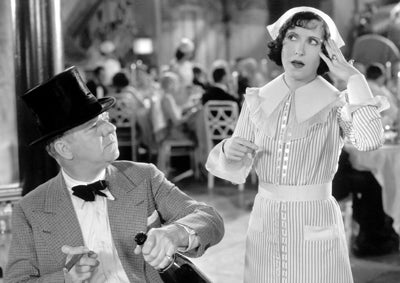"Measured in laughs, this potpourri of unrelated talents is surprisingly good." -- New York Times
Directed by Edward Sutherland
The manic, boisterous energy that marks many Hollywood comedies of the early sound era—rarely matched in subsequent decades—owes almost entirely to the presence of vaudeville stars who found second careers on the big screen. The melding of vaudeville’s kaleidoscopic variety aesthetic with Hollywood’s narrative impulse lead to the emergence at the time of a new sub-genre, that film scholar Henry Jenkins' dubbed the “anarchistic comedy.” In the anarchistic comedy, plotlines and characterization were shoved to the back to make way for anything-goes routines and performances.
Featuring a cast that Film Daily described in 1933 as “a fortune in marquee material,” International House rides high on dizzy turns by W.C. Fields, George Burns, Gracie Allen and Peggy Hopkins Joyce, making her sound film debut. The ostensible plot is set in motion by the eccentric Dr. Wong (Edmund Breese), who calls an international conference at a swanky hotel in “Wu Hu, China,” to demonstrate his latest invention, the radioscope, which can pick up images and sound from anywhere in the world. As potential investors from among the jet set descend on the hotel—literally in the case of Fields' Professor Quail who arrives via “autogyro” dubbed The Spirit of Brooklyn—various storylines emerge all in the interest of highlighting hilarious bits of comic business by the cast. Adding to the mayhem, as Dr. Wong searches the ether on his device, the film is given over to popular radio entertainers like Rudy Vallee, Baby Rose Marie (several decades before she achieved television stardom on The Dick Van Dyke Show) and Cab Calloway (performing "Reefer Man"), all of whom were recorded in Paramount’s famous Astoria studio.
While often described as a “pre-Code” comedy, International House was, indeed, given the once-over by the Hays Office, which declared “the whole picture is vulgar and borders constantly on the salacious.” Not that Paramount cared at the time. The studio caused an uproar with local exhibitors when it agreed to cut a line that the censors found particularly offensive—getting into a car, Peggy Hopkins Joyce accidentally plops down on a kitten, complaining “I’m sitting on something,” to which Fields shoots back “It’s a pussy”—but released the film with the line clearly intact.
Paul Malcolm
Paramount Productions, Inc. Producer: Emanuel Cohen. Screenwriters: Francis Martin and Walter DeLeon. Story by: Neil Brant and Louis B. Heifetz. Cinematographer: Ernest Haller. Editor: James Smith. With: W.C. Fields, Stuart Erwin, Sari Maritza, George Burns, Gracie Allen, Bela Lugosi, Cab Calloway, Baby Rose Marie.
35mm, b/w, 68 min.
Preserved in conjunction with Universal Pictures from a 35mm composite nitrate print. Laboratory services by The Stanford Theatre Film Laboratory, Audio Mechanics, DJ Audio, Simon Daniel Sound. Special thanks to Bob O’Neil.
Watch the TRAILERS FROM HELL trailer below:







